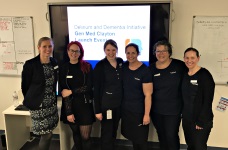Monash Health has embarked on an ambitious initiative to improve the early recognition of and response to patients with cognitive impairment (delirium and dementia) in acute and sub-acute services, ensuring these patients receive safe and high-quality care in hospital. Based on the work of the Care of Confused Hospitalised Older Persons (CHOPs) program in NSW, the initiative covers all elements of cognitive care, from screening and assessment through to management and discharge planning. It is supported by a comprehensive staff education program and the appointment of a Cognition Clinical Lead.
Cognitive impairment in hospitals is not seen as a ‘glamour’ issue when it comes to innovation and improvement priorities, so one of the first challenges was getting an organisational commitment to addressing the issue, and providing resources to support an effective solution. And the commitment had to be long-term (minimum 2 years) as we knew there was no simple or short-term fix.

The next challenge was the stakeholder engagement to determine what our implementation was going to involve and then tailoring the program to various clinical areas.
Our final problem will be maintaining the momentum.
There is no shortage of resources to support best care for patients with cognitive impairment so we were conscious of not re-inventing the wheel. Various organisations have been very generous in sharing their knowledge and learnings with us, namely those involved in the CHOPs Program in NSW and the Environmental Design Education Service within Dementia Training Australia. But we also had to tailor the solution to our setting. We undertook extensive planning and wide-ranging stakeholder consultation, which is paying off now in our implementation phase.
We have just started our implementation journey – starting with the General Medicine wards at our largest campus. The staff experience of implementation has been very positive, and the staff have valued the support of the Cognition Clinical Lead (a new role for our organisation). Education has been well-attended and online resources have been accessed by large numbers of staff. Staff are now:
Compliance rates with cognitive screening have been very high, nearing 100%, and falls and Code Greys appear to have reduced in this cohort.
We are about to start Phase 2 implementation at our subacute campus.